Pages
Friday, December 29, 2006
Sunday, March 19, 2006
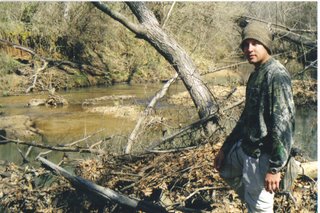
Spring Break in Georgia
This months’ adventure took place in the southern temperate forests of Georgia. Although in the title I stated it was my spring break, and indeed I was off from work and school, the weather was still not quite like typical spring. For a Floridian like me it was still a little cold there, dipping down into the high thirties one night. Building a camp fire was one of the most enjoyable activities, not only because I may be a pyromaniac but because the warmth generated from the fire felt quite pleasant.

Another lovely place that was visited was the creek that ran through the 3100 acres of land that my friends are leasing. It was not running fast, but it was running, and the animal tracks up and down the banks showed that the water source was essential for sustaining the local habitat.
Mostly deer, raccoon and turkey tracks were seen. As we were looking for good sites to erect tree stands I came across a small rat snake and also a couple of armadillos. On a trip to the small town we saw a couple of hen Turkey and a male Gobbler pecking at some seed in a field.

Saturday, February 25, 2006
Exotic Boa Constrictor in Everglades
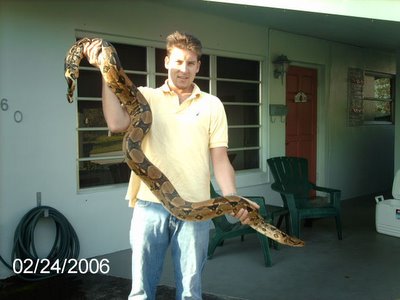
Boa Constrictor Found in Florida Everglades
This Boa sighting and capture in the Florida Everglades was amazing. At almost 9 ft long she was a handful. I am lucky she did not wrap one of those muscular coils around me; sending me to bed . These snakes are native to South and Central America (indicated by the green below) and are an exotic species here in Florida. 
I have always loved Boa constrictors, and even had a few individuals as an adolescent. Although, this is not the first time I have caught them in the wilds of sunny South Florida. The first time I was merely 13 years old and my friends and I came across 6 - 8 very small individuals lying in some grasses along a canal in Davie, Fl. At that time we assumed that the snakes were released by some irresponsible care-taker. But as I look back on that scenario, I can now envision the mother of those snakes not far off the side of the road sitting still in a nearby Australian Pine, which I would like to add is also an invasive species here in Florida, waiting in complete stillness for an unknowing song bird to come within striking distance.
It is hard to fathom a sighting of a Boa Constrictor in the Everglades, perhaps I thought I would see a Burmese python or Reticulated python due to the fact that sightings have already been confirmed. I am asked very frequently if I come across many Burmese pythons as I survey the Everglades tree islands in Water conservation areas 3A and 3B in Broward, Dade, and Monroe counties. I suppose people think their are very large numbers of pythons out in the glades, because that is what makes the news. I have been on many Tree islands and this is the first time I have seen a large constrictor or rather any constrictors, besides the 6 foot Yellow Rat snake I came across a couple of months ago.
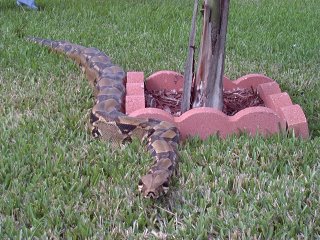
Needless to say, it is definitely a problem. This particular individual was so large and fat that I suspect it had been eating very well. The numbers of native water fowl and song birds it had eaten since the time of its release is most likely very high. This is a serious problem for the ecology of the Everglades. There are no natural enemies to these invasive exotic snakes and therefore a quite detrimental situation arises. Thanks to my co-worker and friend Craig we were able to remove it from the Glades where it had no business being; even though it looked so content sitting there on its own private island.
Be careful she bites. I guess if someone took me away from my personal heaven, full of all the food I could eat, all the sun I could soak up, and all the water I could drink I would be mad too.
No hard feelings!
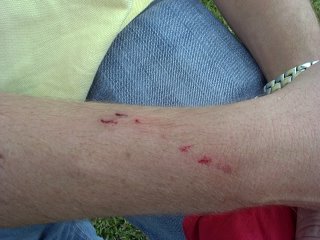
Check out more about Boa Constrictors at www.boa-constrictors.com
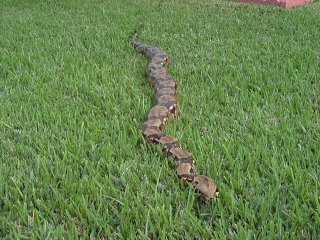
Friday, February 10, 2006
Atomic Bomb at Marshall islands
 After the war, in December of 1945, President Harry S. Truman,"to determine the effect of atomic bombs on American warships,” chose the Bikini atoll, because of its location away from regular air and sea routes, to be the new nuclear proving ground for the United States government. One of these many tests deliberated in the area known as the Marshall Islands was the Bravo Hydrogen Bomb test, which was the largest weapon ever tested by The United States.
After the war, in December of 1945, President Harry S. Truman,"to determine the effect of atomic bombs on American warships,” chose the Bikini atoll, because of its location away from regular air and sea routes, to be the new nuclear proving ground for the United States government. One of these many tests deliberated in the area known as the Marshall Islands was the Bravo Hydrogen Bomb test, which was the largest weapon ever tested by The United States.
March 1, 1954, after the native islanders were evacuated and told that they soon would be able to return, the bomb was detonated. The radioactive particles were supposed to carry with the wind out to sea and away from the inhabited islands, but a tasteless mistake was made. Years later after returning to their once pristine island homes the natives of this region were still feeling the effects of this experimentation. So once again the islanders left the island atolls not only leaving their culture, but also their heritage to forever blow in the wind like palm tree fronds.


Friday, January 27, 2006
Busy Busy Busy

The days are flying by and I have many things on my plate. From school, to my three jobs, and loads of HW and reading I have little spare time. I have so much I want to do and so little time.
I find the Everglades and all natural areas quite soothing to the soul. I need to let my soul catch up to my body on occasion, so I often take a look at art or I either draw myself. One photographer I like to keep up with is Clyde Butcher. His compelling black and white photographs show the Everglades, and many other complex ecosystems, with great detail. I met him at his annual Labor Day Muck About Gathering in 2005 while I was volunteering my time, giving tours in the Big Cypress area of the FLorida Everglades.
Taking pictures is quite relaxing, but I have boxes upon boxes of pictures at this moment that have not found their place in an album or on some ones wall. Take a look at these pictures from Clyde Butcher or check out his webpage at www.clydebutcher.com



 This butterfly was found feeding on one of Floridas primary necteries, the swamp mallow, or hibiscus in my back yard. Can you name this Butterfly? If so " congratulations", you have just identified one of 700 different species found in Florida! The Order Lepidoptera is composed of Butterflies and moths and is the second largest class of insects only beaten by Order Coleoptera; beatles. The order of the Beatles contain twice as many species as butterflies with a grand total of 280, 000 different species. Found below are some more Butterfly pictures, some taken by myself, and others found on the WWW
This butterfly was found feeding on one of Floridas primary necteries, the swamp mallow, or hibiscus in my back yard. Can you name this Butterfly? If so " congratulations", you have just identified one of 700 different species found in Florida! The Order Lepidoptera is composed of Butterflies and moths and is the second largest class of insects only beaten by Order Coleoptera; beatles. The order of the Beatles contain twice as many species as butterflies with a grand total of 280, 000 different species. Found below are some more Butterfly pictures, some taken by myself, and others found on the WWW